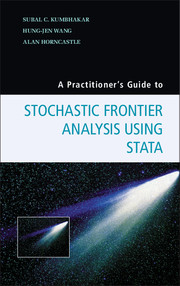Book contents
- Frontmatter
- Dedication
- Contents
- Preface
- PART I GENERAL INFORMATION
- PART II SINGLE EQUATION APPROACH: PRODUCTION, COST, AND PROFIT
- PART III SYSTEM MODELS WITH CROSS-SECTIONAL DATA
- PART IV THE PRIMAL APPROACH
- PART V SINGLE EQUATION APPROACH WITH PANEL DATA
- PART VI LOOKING AHEAD
- APPENDIX
- A Deriving the Likelihood Functions of Single Equation Frontier Models
- B Deriving the Efficiency Estimates
- C Deriving Confidence Intervals
- D Bootstrapping Standard Errors of Marginal Effects on Inefficiency
- E Software and Estimation Commands
- Bibliography
- Index
Preface
Published online by Cambridge University Press: 05 February 2015
- Frontmatter
- Dedication
- Contents
- Preface
- PART I GENERAL INFORMATION
- PART II SINGLE EQUATION APPROACH: PRODUCTION, COST, AND PROFIT
- PART III SYSTEM MODELS WITH CROSS-SECTIONAL DATA
- PART IV THE PRIMAL APPROACH
- PART V SINGLE EQUATION APPROACH WITH PANEL DATA
- PART VI LOOKING AHEAD
- APPENDIX
- A Deriving the Likelihood Functions of Single Equation Frontier Models
- B Deriving the Efficiency Estimates
- C Deriving Confidence Intervals
- D Bootstrapping Standard Errors of Marginal Effects on Inefficiency
- E Software and Estimation Commands
- Bibliography
- Index
Summary
This book deals with the estimation of productive efficiency using an econometric approach, which is popularly known as stochastic frontier analysis. The terminology relates to the fact that we are interested in the estimation of frontiers that envelop the data while maintaining the traditional econometric assumption of the presence of a random statistical noise. The frontiers we estimate are consistent with neoclassical microeconomic theory. Because, in reality, producers are not always efficient, the efficiency analysis can be viewed as an extension of the neoclassical theory. In this sense, the approach we consider in this book is based on sound neoclassical production theory and not purely an ad hoc empirical exercise.
Our primary goal in writing this book was to extend the everyday application of these tools beyond the expert practitioner or academic by making it relatively easy for the reader to carry out the complex computations necessary to both estimate and interpret these models. Our secondary goal was to ensure that the latest theoretical models can be implemented by practitioners, as many applications are limited by the software currently available.
As such, we aim at providing the reader with sufficient tools to apply many of the developed models to real data. In order to do this we have created a series of programs written for use in Stata, and they can be downloaded from the following website: https://sites.google.com/site/sfbook2014/. These commands are not part of the official Stata package, but instead are commands that we wrote ourselves in the form of Stata ado-files.
Thus, this book does not represent a comprehensive research monograph covering all areas of stochastic frontier models. Our focus is mostly on those models for which we have provided Stata codes and, as such, our list of references is limited to this purpose.
For a purely theoretical underpinning of stochastic frontier analysis the reader should consider first reading the book by Kumbhakar and Lovell (2000), Stochastic Frontier Analysis (Cambridge University Press). However, this is not essential as this book is intended to provide stand-alone reference materials for the reader to gain both a basic understanding of the theoretical underpinnings and a practical understanding of estimating production, profit, and cost efficiency.
- Type
- Chapter
- Information
- A Practitioner's Guide to Stochastic Frontier Analysis Using Stata , pp. xiii - xivPublisher: Cambridge University PressPrint publication year: 2015

